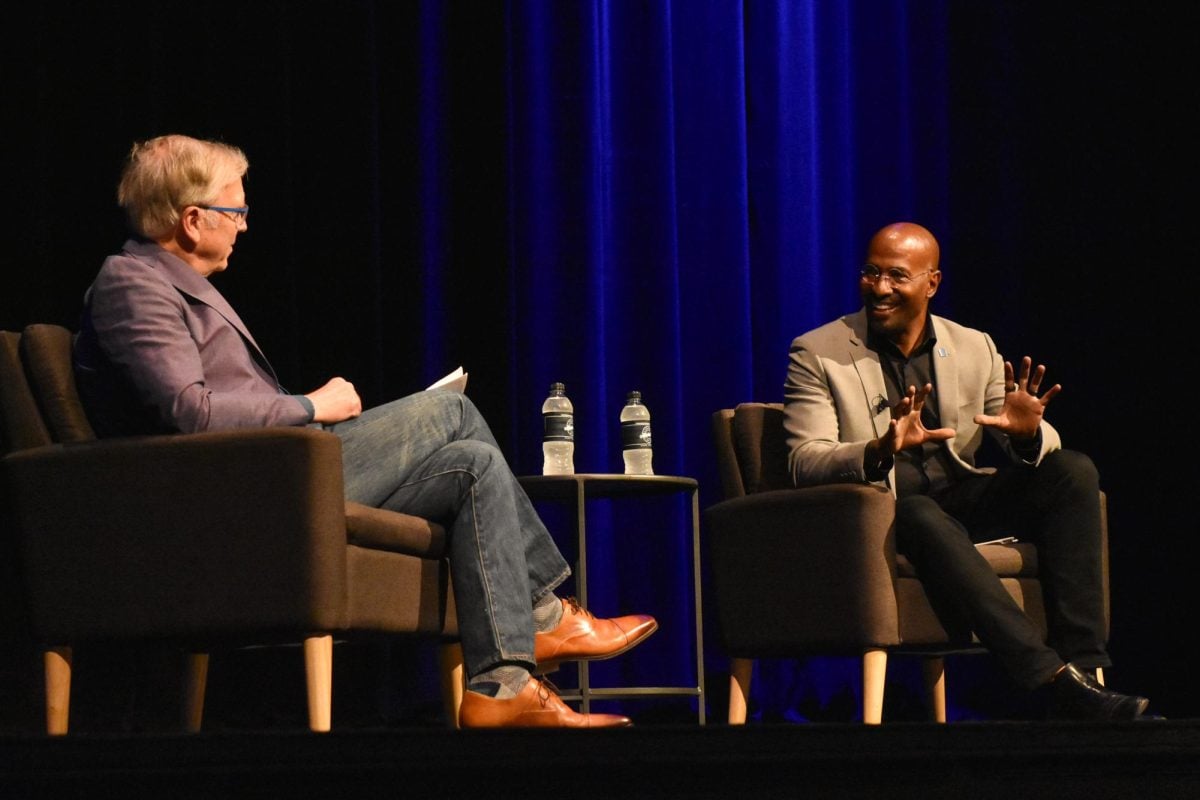CNN political analyst, lawyer and civil rights advocate Van Jones recounted his experiences navigating journalism and politics and shared takeaways about the upcoming U.S. presidential election Tuesday at Northwestern College Democrats’ fall speaker event in Cahn Auditorium.
The event, moderated by political science and Medill Prof. Larry Stuelpnagel, drew a crowd of about 60 attendees.
Based on his assessment, Jones said Vice President Kamala Harris has had to pull off several challenges in record time — from setting up her campaign to accepting the Democratic presidential nomination — in the upcoming election race.
During the two weeks after President Joe Biden dropped out of the race, he said Harris showed her true charismatic self but has since become “tight” as the race has progressed.
“The best thing I ever saw from Kamala Harris was when all of a sudden, Joe Biden stepped back, and it’s loose football and she caught it,” Jones said. “There was nobody telling her what to do. That’s when you saw Kamala Harris.”
Attendee and Medill freshman Sarah Jacobs said she found this take on the Harris campaign very insightful.
“It gave me an inside look as to how she’s had to quickly adapt having just like 100 days before the election,” Jacobs said. “It also put me more in her shoes, almost feeling the anxiety of having to really fight for our nation with such a short amount of time.”
Jones said many young people today lack media literacy.
This skill was essential for Jones when he worked as a special advisor in the White House during former President Barack Obama’s administration, he said.
Jones said he began his career as a journalist at a time when the country was still in the process of desegregating. During his time in college, he interned at the Shreveport Times in Louisiana, where he said he experienced racism and incidents of biased reporting toward Black communities.
The role of the media in keeping these “old stereotypes in place” appalled Jones so much that he decided to leave the field and become a lawyer.
Jones said his journalistic background benefited him greatly when he attended Yale Law School.
“If you are a good journalist, you know one thing: how to ask questions and how to get them answered,” Jones said. “(Journalism) is the tough discipline of getting to the truth, getting the facts, not letting up, finding out what’s really going on.”
During his time as a lawyer, Jones said he focused on fighting against police brutality and mass incarceration. However, after 15 years of activism in Oakland, California, Jones said he became depressed from witnessing a lack of change.
After frequently traveling to Marin County to “heal himself,” Jones said he noticed a big difference in the pollution levels between Marin and Oakland.
“(Oakland children) got asthma inhalers because the port is polluting these children’s lungs every day, all day,” Jones said. “The kids in Oakland need green jobs, not jails.”
Jones helped found the Oakland Green Jobs Corps, which provided Oakland residents with job support and experience to pursue careers in renewable energy. The Oakland City Council allocated around $100,000 for the program, he added.
This program, Jones said, led to the Green Jobs Act of 2007, which established a renewable energy worker training program across the nation.
From all these experiences, Jones wrote a book called “The Green Collar Economy: How One Solution Can Fix Our Two Biggest Problems,” which ultimately led him to begin working under Obama to manage a program for clean energy solutions.
All of this came crashing down, Jones said, when Fox News “canceled” him by criticizing him for his “leftist radical” political activities in the ’90s while he was a lawyer.
In a matter of days, Jones said he became an unwelcome figure at the White House and eventually resigned from his job. This left him clinically depressed, he added.
From this experience, Jones urged young people to resist the culture of “mob destruction of people” over mistakes. The CNN political reporter now regularly appears across the network’s political programming.
Medill sophomore Aidan Klineman said he appreciated hearing Jones’ experiences from being an activist to working in the political world to eventually returning to journalism.
“I think (his talk) solidified my own belief that journalism is more than just writing and reporting — it’s more of a broader field,” Klineman said.
Email: ninethkanieskikoso2027@u.northwestern.edu
Related Stories:
— NU political clubs drive discourse ahead of the upcoming election
— Former Secretary of State John Kerry emphasizes youth influence in climate action
— Texas politician Beto O’Rourke speaks at Northwestern College Democrats fall speaker event







